
JULIA LEE BARCLAY-MORTON – YOGA, WATER AND REWRITING AUTISM
I interviewed writer Julia Lee Barclay-Morton about her experience of autism. Julia began as an experimental dramatist in New York, moving to the UK to
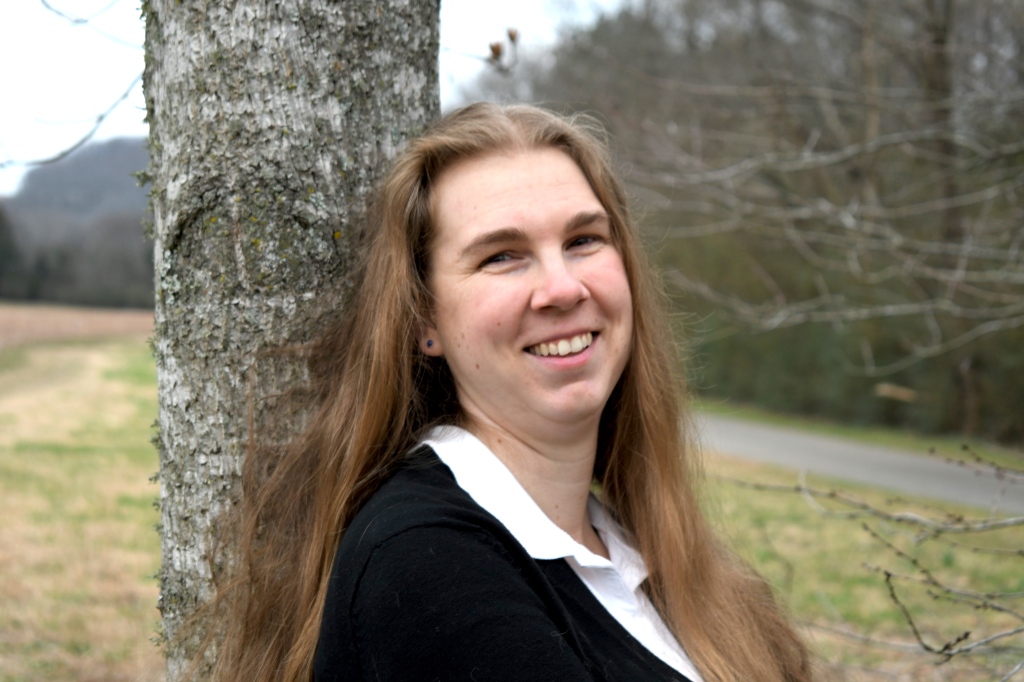
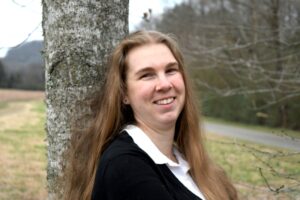
I interviewed Anneliese M. Knop who was born with a degenerative retinal condition, but whose REAL story is about achieving a B.A. in Communication Arts and a Master’s in Christian Clinical Counseling while studying a variety of martial arts and making up stories since childhood. Anneliese describes herself as a reader, hiker, swimmer, seeker and space cadet who one day is going to change the world.
Leslie: Can you tell us the life story, please, behind your self-description as a ‘blind martial artist’ and ‘like a daredevil but prettier’?
Anneliese: I’ve always been interested in martial arts, mostly for the “cool” factor. As a kid, though, you can’t learn everything you want to so I focused more on music. I had the chance to practice a variety of styles of karate, tae Kwan do, tai chi, and kung fu beginning in high school, and found my childhood passion wasn’t at all unfounded.
Being blind while studying the martial arts presents some challenges. You can’t learn by watching and imitating, and mirrors don’t help you confirm you’re doing it right. But it also afforded me some unique advantages. I learned quickly how to feel an opponent’s whole body through a single instant of contact, how to predict where they’d be in the next moment. Everyone has strengths and weaknesses on and off the mat; the trick is to invest in both so your weaknesses become challenges and your strengths become superpowers.
As for Daredevil, he’s a Marvel Comics character who is blinded at a young age and uses his martial arts skills to fight for justice at night and his law degree to win that same fight during the day. I don’t have a law degree; I’m a counselor by day and a fantasy author by night. So, I’m like Daredevil, but definitely prettier by all reports.
Leslie: Can you tell us about a few situations that have changed your life. What have you learned from them?
Anneliese: What a broad question! I’ll try to limit my answer to only half the length of a decent novel. Here are three stories I like to share with people about life-changing moments in my history.
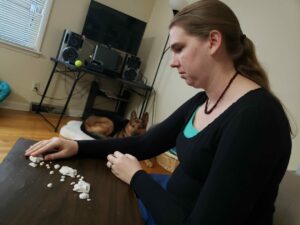
Leslie: You describe yourself as a ‘self-diagnosed Mary Sue’. How have perfectionist tendencies affected/changed your life for better and for worse?
Anneliese: This is quite an insightful question. Perfectionism has certainly been part of my life since I can remember. I recall being intrigued by the fact that the direct translation of the Latin word “perfectus” actually means “complete”. Pair that with family mottos like “work done, then fun,” and you can see how a natural derive and cultural appreciation for excellence can turn into a toxic perfectionism simmering away in the back of the mind. It wasn’t until a professor of mine told me that I had permission not to make myself miserable for the sake of being responsible that I began to realize I had idolized responsibility, perfection, completeness. They were all one and the same to me. But it wasn’t until I’d read C S Lewis’ Perelandra that I began to accept my drive for perfection as an excess of a genuinely good character trait. After that professor’s momentous words I quit a club I hadn’t yet found value in, quit a boyfriend I hadn’t succeeded in fixing, and quit an internship that created chiropractic nightmares because of the stressful environment. And after reading Perelandra I began to trust myself again, to trust my judgment that I could revise and edit, spend a few extra hours on projects because getting them done as perfectly as I could would bring me lasting satisfaction. That conversation and that book helped me find a balance between what I wanted to do well, and what I didn’t need to be doing at all.
Leslie: How would you describe the dogs who have been your companions & helpers in life? If there was an adaptation between you and them, what was it, and was it different according to the dog?
Anneliese: Any discussion of dogs in my life has to begin with my pet Sheltie, Lady. She would NOT have made a good service dog for me. Besides being too short, she was a very timid home-body. But she was my companion for years and years. She died while I was away training with my very first Seeing Eye dog, Prada. I think Prada and Lady would have gotten along, but I’ll never know.
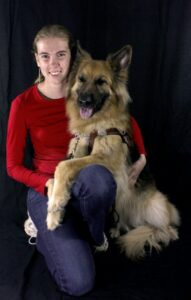
Prada was quite a diva. She was a long-haired shepherd, and she knew just how gorgeous she was. Adapting to her from Lady was mostly a size issue, though. The first time I bathed Prada I forgot that it had been easy to bathe Lady because she was too short to jump out of the tub. Prada did NOT have that difficulty. I eventually decided it was worth paying professionals to be the evil water-gods, and then swoop in and rescue her once she was clean and fluffy again.
Prada was a surprisingly good dorm dog for a German shepherd. She was pretty laid-back. She didn’t mind the occasional chaos that erupted around us, and she had a habit of herding me into bed at reasonable hours. But with her relaxed nature it was easy to slip into some bad habits together. We weren’t quite the sharp working pair you’ll see pictured in the media. She protected me from obstacles, got me where I needed to go, but neither of us were sticklers for the rules. Not so with my Greta.
Greta is my current dog. She’s definitely a class clown. She chases her tail on command and teaches herself new tricks and games to get attention all the time. I had to sharpen up my game with her, though, because she had all the intensity you could ask for in a shepherd. While training with her I identified and discarded a lot of bad habits, relearned some important concepts, and began to wonder if I was actually mentally disciplined enough to handle a German shepherd properly.
This insecurity grew over time, and it found fodder when Greta acquired a canine anxiety disorder from an extremely stressful work environment a couple of years ago. My doubts were realized, and after a year or so of trying to rehabilitate her on my own I finally got us each a therapist. Working with a counselor (yes, even counselors need counselors) and a dog trainer, Greta and I are reclaiming our identity as a well-honed working team. It’s been a long road, but a fruitful one. And I look forward to being able to apply what I’ve learned with greta to future dogs.
Leslie: Tell us about the process of learning your other creative activities – space cadet, pianist, writer – how have you dealt with the barriers you’ve faced in these areas?
Anneliese: I attended a program called Space Camp for Interested Visually Impaired Students 3 years in a row. It was the first time I’d interacted with like-minded blind students in an environment more focused on our interests than in making us feel positively about our disabilities. So, there weren’t a lot of barriers there. Especially not when a mentor at university helped me establish a two-year internship at NASA based on the premise that I could hear and analyze vocal quality over radio better than any other console controllers on staff.
Studying piano, though, has been a challenge. I learned from a wonderful lady for 13 years. She and my mom, who is a professional accompanist herself, worked together to develop ways that I could read sheet music. I’m well-versed in music theory, but I will never attain the easy competence of sight-reading. Everything I do is memorized, or improvised. Until recently this meant that any composition I wanted to do took a great deal of effort, so I only did the minimum requirements for my studies. It got harder in college as I realized just how much time my mom had put into making music accessible. It was time I couldn’t afford to spend on electives like jazz piano lessons.
But as a fantasy author I’ve felt my musical interests resurfacing lately. I’ve wanted to compose ballads for several of my projects. I’ve been experimenting with software that will allow me to compose directly from the keyboard into a computer, figuring out how to use a voice recorder to “scribble” brief themes and melodies down for later development, and researching medieval European and middle Eastern musical concepts.
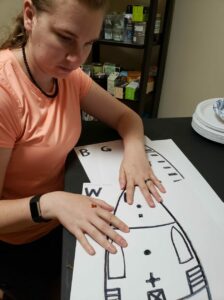
Technology has really changed how I engage in my creative efforts. Not just music, but writing as well. Instant messaging, Google Drive, the internet in general opens up collaboration, editing, and writing research in ways that would’ve taken up time I couldn’t afford to spend on hobbies even a few years ago. When my co-author spent a year as a missionary in Japan she and I were still able toc collaborate using these tools. Twenty years ago that would’ve been a challenge for sighted people, let alone the disabled!
Leslie: What advice would you give to sighted people to help them understand the range & diversity of partially-sighted people and the situations they experience?
Anneliese: “So exactly how blind are you?” “What can you see/” “Can you see light and shadows?”
If you do that “how many fingers” thing you’ll find out how good a martial artist I am!
No, really, these questions don’t bother me on principle, but they are very difficult to answer. Those who had full vision and lost all or some of it do a much better job answering them. But I was born with roughly 75% vision loss, and I’m now close to 90% blind. I’ve never been able to see normally, so trying to describe how different my, or any blind person’s experience is from that of a sighted person is a real challenge.
A better question might be “what do you need help with?” Or better yet “Let me know if you need help, otherwise I’ll just be out of your way.”
Instead of putting the burden of explaining something so complex on someone who’s already tackling a disability every second of the day, invite them to show you how they’ve overcome their challenges, let them know you’re there if they need you but that their success is more important than your participation in it.
You can find out about Anneliese’s newly-published book here
Next week I interview Tamara Evans Braun about her efforts to limit her impact on the planet, which she discusses on her website ASPIRING GREENER.
ABOUT LESLIE TATE’S BOOKS:

I interviewed writer Julia Lee Barclay-Morton about her experience of autism. Julia began as an experimental dramatist in New York, moving to the UK to

I interviewed Gillean McDougall from Glasgow, who edited the collaborative projects Honest Error (on Charles Rennie Mackintosh and his wife Margaret Macdonald) and Writing the

I interviewed French writer Delphine de Vigan, whose book, No et moi, won the prestigious Prix des libraires. Other books of hers have won a clutch

I interviewed Joanne Limburg whose poetry collection Feminismo was shortlisted for the Forward Prize for Best First Collection; another collection, Paraphernalia, was a Poetry Book Society Recommendation. Joanne

I interviewed Katherine Magnoli about The Adventures of KatGirl, her book about a wheelchair heroine, and Katherine’s journey from low self-esteem into authorial/radio success and
| Cookie | Duration | Description |
|---|---|---|
| cookielawinfo-checkbox-analytics | 11 months | This cookie is set by GDPR Cookie Consent plugin. The cookie is used to store the user consent for the cookies in the category "Analytics". |
| cookielawinfo-checkbox-functional | 11 months | The cookie is set by GDPR cookie consent to record the user consent for the cookies in the category "Functional". |
| cookielawinfo-checkbox-necessary | 11 months | This cookie is set by GDPR Cookie Consent plugin. The cookies is used to store the user consent for the cookies in the category "Necessary". |
| cookielawinfo-checkbox-others | 11 months | This cookie is set by GDPR Cookie Consent plugin. The cookie is used to store the user consent for the cookies in the category "Other. |
| cookielawinfo-checkbox-performance | 11 months | This cookie is set by GDPR Cookie Consent plugin. The cookie is used to store the user consent for the cookies in the category "Performance". |
| viewed_cookie_policy | 11 months | The cookie is set by the GDPR Cookie Consent plugin and is used to store whether or not user has consented to the use of cookies. It does not store any personal data. |